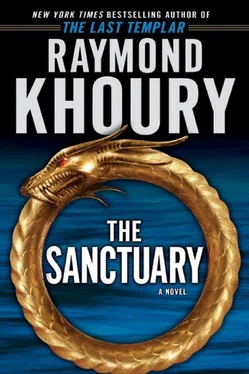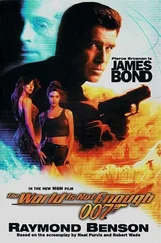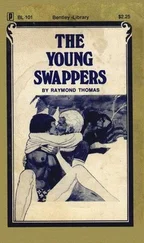“Whereas a smuggler caught up in some kind of dirty deal is not a reflection of political instability and therefore much easier to brush off,” Kirkwood observed, somewhat wryly, before turning to Corben. “You see what we’re dealing with here.”
“I can’t imagine it would reflect well on your organization to have her paraded as a smuggler,” Corben countered.
Kirkwood considered his comment for a beat and nodded guiltily. “Of course, it wouldn’t. I won’t deny that we’re also keen to avoid any tainting by association. The organization doesn’t exactly enjoy wholehearted support on Capitol Hill. We’ve only just managed to rejoin it as a nation, and that wasn’t easy to pull off.” The United States had, in fact, been one of the thirty-seven founding members of UNESCO, the United Nations Educational, Scientific, and Cultural Organization. The organization, which opened its doors in 1945 shortly after the end of the war, was set up to promote peace and security by encouraging collaboration among nations through, well, education, science, and culture. Over the next four decades, as it grew to include over 150 countries as members, its policies — primarily its foreign policy, which was deemed worryingly “leftist”—diverged from the United States’ own agenda. The rift reached a head when the United States finally withdrew from the organization in 1984. It only rejoined in 2003 in a bipartisan token gesture from President Bush, but you didn’t have to dig deep to realize that the organization was still viewed with the same skepticism and contempt in official circles in Washington as was its big brother, the UN.
“This needs to be handled with utmost care,” the ambassador affirmed, “both in terms of getting Evelyn Bishop back and in terms of what we tell the public.”
Corben studied the two men for a moment. “As far as getting her back, you know that’s our priority too. As far as the media is concerned, well…this isn’t political. We’re pretty sure of that.” He turned to Kirkwood. “I do think it has to do with Iraqi relics, but Evelyn Bishop’s role in that context remains unclear.”
“Do you know what these relics are?” Kirkwood asked.
Corben hesitated briefly. He didn’t want to say any more than he had to, but he had to tread carefully. “Statuettes, tablets, seals. We’ve got some Polaroids,” he informed them.
“May I see them?”
The question somewhat surprised Corben. Kirkwood was drilling deeper than he would have expected. “Sure. They’re in my office.”
Kirkwood nodded. “Okay. So we think she got involved with these guys in some way. But was she a willing partner in the transaction, or was she out to stop it from taking place? Do you see what I mean? That’s the angle we need to adopt. She got wind of it somehow, she tried to stop them or turn them in, and they grabbed her. Knowing her, it’s probably what really happened.”
“It would certainly work for everyone,” the ambassador noted.
“The thing is,” Corben observed, “she didn’t contact anyone about this. If she really was out to stop them, she would have called someone — and given the smugglers a reason to silence her. Which is what my real concern is here. If this is actually what happened, and they’re out to silence her…they’re not going to come to us with any demands. We need to get through to them and offer them something for her safe return. Assuming they haven’t gone too far already.” He looked at them grimly.
“I assume you’re going to put the word out through your channels, get the message out that we want her back, no questions asked,” the ambassador asked.
“I’ve already got that going,” Corben assured him. “But our contacts are much weaker since the summer. The country’s divided right down the middle. One side won’t talk to us at all, and the other one isn’t of much use in this case.”
“I have a lot of contacts in the area,” Kirkwood told Corben. “I’d like to work with you on this. There may be a different set of people I can reach out to than the ones you have access to. We have a lot of contacts when it comes to Iraqi antiquities. And it can be seen as a neutral, UN-led effort, rather than coming directly from the Great Satan,” he added, using the region’s favorite epithet for America.
Corben looked at the ambassador, who was clearly comfortable with the request. Corben wasn’t. He always worked alone. It was as much a part of his job description as it was a personal choice. And although he didn’t relish having someone looking over his shoulder, Corben couldn’t exactly refuse. Besides, Kirkwood could prove helpful. The UN did have extensive contacts in the area. And, after all, finding Evelyn would undoubtedly lead to the hakeem. Which was the endgame, though it wasn’t something he was too keen to share with either man before him.
“Not a problem,” Corben agreed.
Kirkwood surprised him with his next question. “I hear there was another woman involved. What do we know about her?”
“Mia Bishop,” Corben informed him. “She’s her daughter.”
The living room was basking in the soft glow of dusk as Mia stirred out of her slumber on Corben’s sofa. Blinking her eyes open, she was momentarily confused by the unfamiliar surroundings, then it all came rushing back. She sat up slowly and mopped the languor off her face with her hands. She waited for her senses to reboot, then pushed herself to her feet and padded over to the French doors and out onto the balcony.
The buildings across the street were uniformly gray and looked as tired and weary as she felt. Many of the balconies had been glassed in illegally, turning outdoor terraces into interior space, and shrapnel scars and bullet holes pockmarked virtually every façade. A forest of television aerials sprouted from the flat roofs, and telephone and electricity wires cobwebbed overhead, a constant reminder of the patched-up, makeshift feel of the place. From a strictly aesthetic point of view, this wasn’t an attractive city, not by any means. And yet, somehow, defying expectation and logic, it charmed anyone who visited it. Including Mia.
She was drying herself off after a quick shower when she heard some noise coming from the front door. Her whole body went rigid. She listened intently, then quickly wrapped herself in a towel and crept up to the bathroom door. She inched the door slightly ajar and peered through the narrow slit. She couldn’t see the front entrance. Her mind flew into overdrive. Should she barricade herself in the bathroom? Bad idea. It didn’t have any windows. Should she scuttle over to one of the bedrooms, which had access to a balcony? Not hugely useful, given that the apartment was on the sixth floor of the building and that she didn’t feel like doing another high-wire act. She was running out of options when the dead bolt clicked noisily and the door juddered open. Every hair on her body went stiff for a nanosecond, before Corben’s voice rang out through the flat.
“Mia?”
She shut her eyes and breathed out in relief, chiding herself for letting her imagination run amok. “I’ll be out in a sec,” she replied, making a concerted effort to sound as unflustered as possible.
She got dressed and found Corben in the kitchen. He had brought back her cell phone. She switched it on and saw that she had a couple of messages. That Evelyn was the abducted woman in the news was starting to leak out. The first message was from the project supervisor at the foundation. The second was from Mike Boustany, the local historian who was working with her on the project and whom she’d gotten to know quite well. She needed to call them both back and let them know what had happened, but decided it would keep until the morning. She also knew more concerned friends and colleagues would be calling as the news spread, so she set her phone to a low ring, opting to screen her calls. The only call she’d take, if it came in, was from her aunt in Boston. She wanted to discuss things with Corben more thoroughly first. He had also picked up some food on his way back, and she felt ravenous.
Читать дальше












